第14章 VI MY ROMANCE WITH FIAMMETTA(2)
Now this was strange counsel, yet it had so great weight with me that I was persuaded by it, and after lying a night at the Swan-and-Quiver Tavern I went back to London, and never again had a desire to visit Lincolnshire.
But Fiammetta is still a pleasing memory --ay, and more than a memory to me, for whenever I take down that precious book and open it, what a host of friends do troop forth! Cavaliers, princesses, courtiers, damoiselles, monks, nuns, equerries, pages, maidens--humanity of every class and condition, and all instinct with the color of the master magician, Boccaccio!
And before them all cometh a maiden with dark, glorious eyes, and she beareth garlands of roses; the moonlight falleth like a benediction upon the Florentine garden slope, and the night wind seeketh its cradle in the laurel tree, and fain would sleep to the song of the nightingale.
As for Judge Methuen, he loves his Boccaccio quite as much as Ido mine, and being somewhat of a versifier he has made a little poem on the subject, a copy of which I have secured surreptitiously and do now offer for your delectation:
One day upon a topmost shelf I found a precious prize indeed, Which father used to read himself, But did not want us boys to read;A brown old book of certain age (As type and binding seemed to show), While on the spotted title-page Appeared the name ``Boccaccio.''
I'd never heard that name before, But in due season it became To him who fondly brooded o'er Those pages a beloved name!
Adown the centuries I walked Mid pastoral scenes and royal show;With seigneurs and their dames I talked--The crony of Boccaccio!
Those courtly knights and sprightly maids, Who really seemed disposed to shine In gallantries and escapades, Anon became great friends of mine.
Yet was there sentiment with fun, And oftentimes my tears would flow At some quaint tale of valor done, As told by my Boccaccio.
In boyish dreams I saw again Bucolic belles and dames of court, The princely youths and monkish men Arrayed for sacrifice or sport.
Again I heard the nightingale Sing as she sang those years ago In his embowered Italian vale To my revered Boccaccio.
And still I love that brown old book I found upon the topmost shelf--I love it so I let none look Upon the treasure but myself!
And yet I have a strapping boy Who (I have every cause to know)Would to its full extent enjoy The friendship of Boccaccio!
But boys are, oh! so different now From what they were when I was one!
I fear my boy would not know how To take that old raconteur's fun!
In your companionship, O friend, I think it wise alone to go Plucking the gracious fruits that bend Wheree'er you lead, Boccaccio.
So rest you there upon the shelf, Clad in your garb of faded brown;Perhaps, sometime, my boy himself Shall find you out and take you down.
Then may he feel the joy once more That thrilled me, filled me years ago When reverently I brooded o'er The glories of Boccaccio!
Out upon the vile brood of imitators, I say! Get ye gone, ye Bandellos and ye Straparolas and ye other charlatans who would fain possess yourselves of the empire which the genius of Boccaccio bequeathed to humanity. There is but one master, and to him we render grateful homage. He leads us down through the cloisters of time, and at his touch the dead become reanimate, and all the sweetness and the valor of antiquity recur; heroism, love, sacrifice, tears, laughter, wisdom, wit, philosophy, charity, and understanding are his auxiliaries; humanity is his inspiration, humanity his theme, humanity his audience, humanity his debtor.
Now it is of Tancred's daughter he tells, and now of Rossiglione's wife; anon of the cozening gardener he speaks and anon of Alibech; of what befell Gillette de Narbonne, of Iphigenia and Cymon, of Saladin, of Calandrino, of Dianora and Ansaldo we hear; and what subject soever he touches he quickens it into life, and he so subtly invests it with that indefinable quality of his genius as to attract thereunto not only our sympathies but also our enthusiasm.
Yes, truly, he should be read with understanding; what author should not? I would no more think of putting my Boccaccio into the hands of a dullard than I would think of leaving a bright and beautiful woman at the mercy of a blind mute.
I have hinted at the horror of the fate which befell Yseult Hardynge in the seclusion of Mr. Henry Boggs's Lincolnshire estate. Mr. Henry Boggs knew nothing of romance, and he cared less; he was wholly incapable of appreciating a woman with dark, glorious eyes and an expanding soul; I'll warrant me that he would at any time gladly have traded a ``Decameron'' for a copy of ``The Gentleman Poulterer,'' or for a year's subscription to that grewsome monument to human imbecility, London ``Punch.''
Ah, Yseult! hadst thou but been a book!